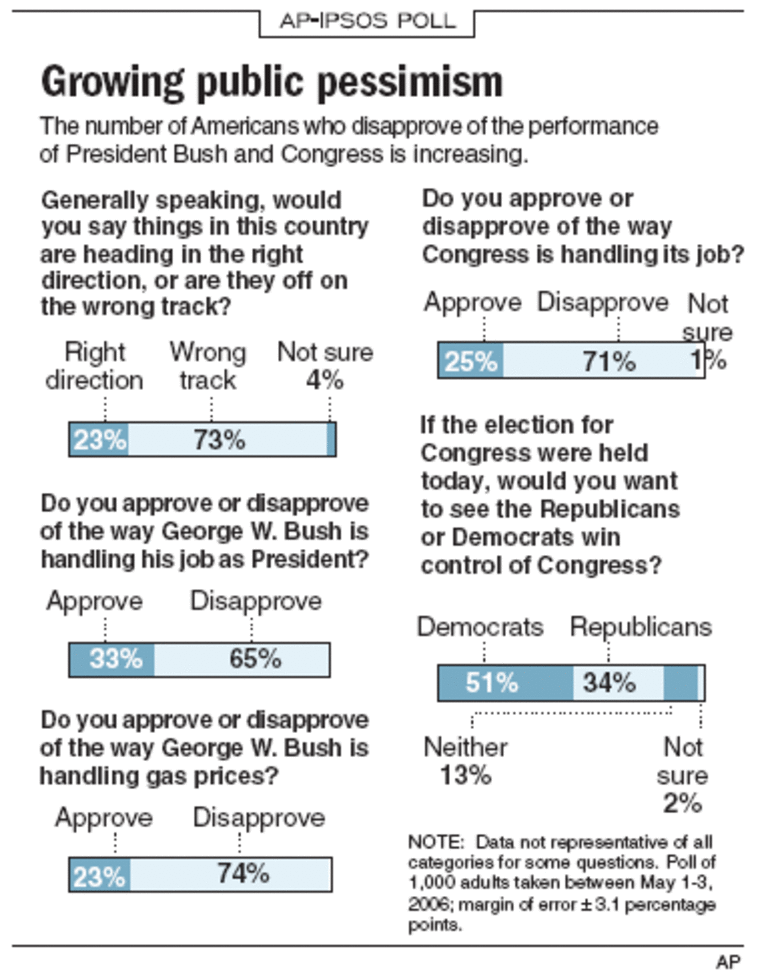Angry conservatives are driving the approval ratings of President Bush and the GOP-led Congress to dismal new lows, according to an AP-Ipsos poll that underscores why Republicans fear an Election Day massacre.
Six months out, the intensity of opposition to Bush and Congress has risen sharply, along with the percentage of Americans who believe the nation is on the wrong track.
The AP-Ipsos poll also suggests that Democratic voters are far more motivated than Republicans. Elections in the middle of a president’s term traditionally favor the party whose core supporters are the most energized.
The poll, conducted by the international polling firm Ipsos, has a margin of sampling error of plus or minus 3 percentage points, larger for subgroups.
This week’s survey of 1,000 adults, including 865 registered voters, found:
- Just 33 percent of the public approves of Bush’s job performance, the lowest of his presidency. That compares with 36 percent approval in early April. Forty-five percent of self-described conservatives now disapprove of the president.
- Just one-fourth of the public approves of the job Congress is doing, a new low in AP-Ipsos polling and down 5 percentage points since last month. A whopping 65 percent of conservatives disapprove of Congress.
- A majority of Americans say they want Democrats rather than Republicans to control Congress (51 percent to 34 percent). That’s the largest gap recorded by AP-Ipsos since Bush took office. Even 31 percent of conservatives want Republicans out of power.
- The souring of the nation’s mood has accelerated in the past three months, with the percentage of people describing the nation on the wrong track rising 12 points to a new high of 73 percent. Six of 10 conservatives say America is headed in the wrong direction.
GOP analyst cites concerns
Republican strategists said the party stands to lose control of Congress unless the environment changes unexpectedly.
“It’s going to take some events of significance to turn this around,” GOP pollster Whit Ayres said. “I don’t think at this point you can talk your way back from those sorts of ratings.”
He said the party needs concrete progress in Iraq and action in Congress on immigration, lobbying reform and tax cuts.
“Those things would give the country a sense that Washington has heard the people and is responding in a way that will give conservatives a sense that their concerns are being addressed,” Ayres said.
Conservative voters blame the White House and Congress for runaway government spending, illegal immigration and lack of action on social issues such as a constitutional amendment outlawing gay marriage. Those concerns come on top of public worries about Iraq, the economy and gasoline prices.
Candice Strong, a conservative from Cincinnati, said she backed Bush in 2004, “but I don’t agree with the way he’s handling the war and the way he’s handling the economy. I think he should have pulled our troops out of Iraq.”

Who’s motivated to vote?
Hard-line conservatives are not likely to vote Democratic in the fall, but it would be just as devastating to the Republicans if conservatives lose their enthusiasm and stay home on Election Day.
AP-Ipsos polling suggests that Democrats may be winning the motivation game. Fewer voters today than in 2004 call themselves Republicans or Republican-leaning. In addition, 27 percent of registered voters were strong Republicans just before the 2004 election, while only 15 percent fit that description today.
Democratic numbers are the same or better since 2004.
“This tells us we’ve got our work cut out for us,” said Sen. Sam Brownback, a conservative Republican from Kansas who may run for president in 2008. “The key for us is to show restraint on spending and on dealing with immigration.”
Bush’s strong suit continues to be his handling of foreign policy and terrorism, an area in which he modestly improved his ratings since April. Still, a majority of Americans disapprove of his performance on both fronts.
It gets worse. Only 23 percent of the public approve of the way the president is handling gasoline prices, the lowest in AP-Ipsos polling. Those who strongly disapprove outnumber those who strongly approve by an extraordinary 55 percent to 8 percent.
What history suggests
As for his overall job performance, history suggests that Bush’s paltry 33 percent spells trouble for Republicans in the fall.
In the past six decades, only one president had a lower job approval rating six months before a midterm election — Richard Nixon in May 1974, the year in which Watergate-scarred Republicans lost 48 seats in the House and four in the Senate.
By November, Nixon was out of a job too, having resigned the presidency in August.
Nearly half of the public strongly disapproves of Bush, a huge jump from his 5 percent strong disapproval rating in 2002. The poll has a margin of error of 3 percentage points.
Of all Republicans, nearly 30 percent disapprove of the job Bush is doing, including 13 percent who feel strongly about it.
“Hopefully this is a wakeup call for my party to get out of its bunker and hunker mentality,” said Republican strategist Greg Mueller, whose firm specializes in conservative politics.
That punching bag feeling
He urged his party to start criticizing Democratic positions on the Iraq war, immigration and the economy.
“We’ve been like a punching bag,” Mueller said.
Democrats need to gain 15 seats in the House and six in the Senate for control of Congress, no easy task in an era that favors incumbents.
“What we have to do is earn the public approval of our right to govern again,” said Democratic Party chairman Howard Dean.
The Democratic strategy is to nationalize the elections around a throw-the-bums-out theme.
Republicans counter that they will do better than polls suggest when voters are forced on Election Day to choose between candidates in their particular House and Senate races.
“But,” Ayres said, “we better get in gear.”